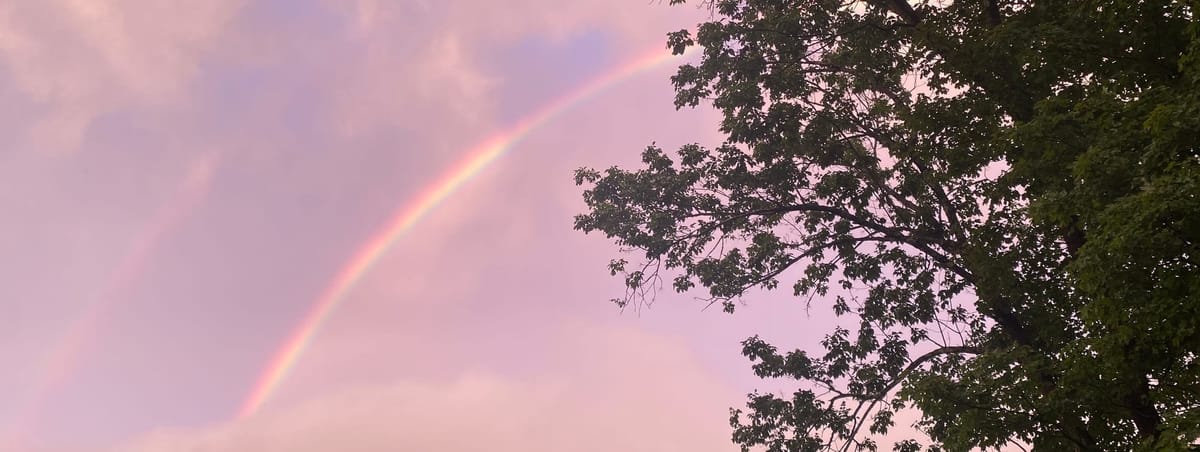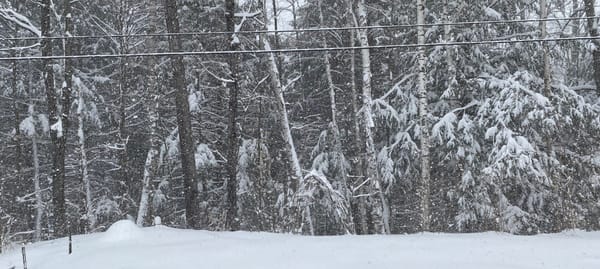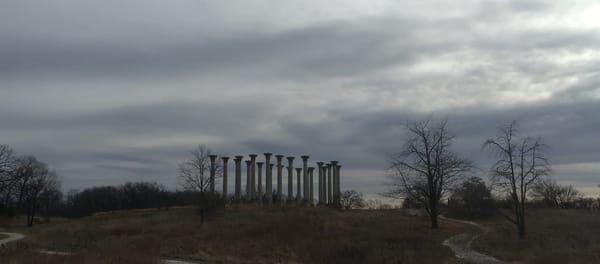My Father's Sermons (Statement of Purpose, part I)
I sometimes wonder how congregants keep up–they have not had the advantage, as I have, of tracking the books piled on the little red bench in the front hallway of my parents’ home.

My parents are book people. They dated briefly when my father was just out of rabbinical school, getting set up again and again by the older members of his congregation. At the time, my mother worked at a bookstore. They went out, it fizzled, and that might have been it. Instead, nearly a year later, my father wandered into her shop looking for a book he’d read about. He didn’t know the author or the title, but she figured it out based on his vague description of the review. My father called her later that day and asked for another date.
I like imagining my parents in that bookstore because I see so much of myself in the story: my parent’s shared love of books; my father, early in the rabbinical career which has been so formative in my own Jewish life.
I wrote about the link between my dad, Judaism, and my writing/reading life in the personal statement I submitted with my MFA applications in the Fall of 2019: “The more I write, the more profoundly I feel my father’s influence. He is a rabbi, and I have been listening to his sermons for my entire life. My father’s Judaism—my Judaism—is a struggle to understand what it means to be human…But more than what I am driven to write about, I think I absorbed something from him about how to string the words together. I can see the legacy of his sermons in the voice I am developing now–conversational and (hopefully) witty, with moments of beauty, reaching for complex ideas and deep emotions.”
A few years ago I remarked to my dad about how emotional it is to hear him deliver his high holiday sermons. He speaks with plainspoken eloquence about why this season of introspection occupies the heart of the Jewish calendar. My sisters and I are often moved to tears. At some point in my twenties I learned to attend Rosh Hashanah and Yom Kippur with a few tissues in my pocket.
My dad, more comfortable conceiving and writing his sermons than delivering them, expressed a degree of surprise.
“Well, you’re my dad,” I said, or words to that effect. And still he did not seem to understand what I was saying. But I knew his father had enjoyed a long career as a civil rights lawyer in Chicago, so I asked him, “Did you ever get to see Grandpa Zemel argue in court?”
My dad was quiet for a moment. “Yes, I remember doing that once or twice,” he said. And then his voice changed, softened. “I remember how that made me feel. I think I understand.”
So yes, his sermons affect me because I am his son, but not only for that. He has an incredible ability to synthesize sophisticated academic writing into simple and relatable ideas–to perceive what is profound and communicate it within a Jewish context. Still, his sermons often include lengthy quotations from his reading, bouncing off one another in a sort of contemporary enactment of Talmudic intertextuality. In these moments, I sometimes wonder how congregants keep up–they have not had the advantage, as I have, of tracking the books piled on the little red bench in the front hallway of my parents’ home.
He reads voraciously. Historical and contemporary Jewish thinkers, continental and analytic philosophy, political theory and cultural anthropology, media and cultural studies, history and sociology. His favorite books open new vectors of thought and curiosity, and their bibliographies become his syllabi. This has been the engine for his rabbinate, decades of self-directed study across the humanities and social sciences.
In my earliest memory of my dad reading, the book is Neil Postman’s Technopoly. He has referenced this text in sermons and synagogue newsletter columns for more than two decades, which is how I know its central thesis argues that technology has supplanted culture as the primary means of human exchange. At the time he first encountered it, when I was in third or fourth grade, I was aware of the book as a slim paperback with a cool title that my dad carried around even when he was reading other books.
A few years later, he read Robert Putnam’s Bowling Alone, which analyzes the changing social structures and dissolving communal bonds of late twentieth century America. It made him pessimistic for a moment, but ultimately convinced him that the synagogue he’d been leading since 1983 would never function similarly to his childhood congregation in Chicago or other post-War Jewish communities. Moreover, attempting to preserve or recapture this earlier American Judaism would only lead to a faith that was creaky and gray.
Call the creaky gray stuff Nostalgia Judaism, and its encroachment is why my dad recognized the importance of Putnam’s book. The issues he discussed with colleagues at other synagogues–the crowdedness of congregants’ lives, their expectations shifting towards a more consumerist approach to participation–were not limited to the Jewish community. This was happening to communal institutions across scope and scale, a point Putnam drove home with his title: between 1980-1993, the percentage of people who had gone bowling in a given year had increased, while the percentage who had bowled as part of a league had plummeted precipitously.
Putnam convinced my father that American society was reshaping itself. How might my father lead his synagogue in response? This question led him to philosopher Charles Taylor, whose A Secular Age argues that a society reshaped by modernity and post-modernity in quick succession means not the end of religion but rather its proliferation and increased importance to being human in the world. In other words, we live in a world where it is possible to consider oneself spiritual without being religious–an idea that would have made no sense before the Enlightenment. We strive individually, with our mindfulness apps and conscious consumption and ecstatic workout classes, to address the fundamental needs that once were addressed by organized religion. This revelation ushered in the “if it’s not broken, break it” model of innovation at my dad’s congregation. No one would ever revitalize the Ashkenazic-community-center model that was the midcentury synagogue, so my father devoted himself to imagining new ways a synagogue could be. And he did that by reading. After forty-two years at his pulpit, he will retire next summer.
This newsletter, in its own way–in my own way as a reader, as a Jew, and as my father’s son–is an attempt to grapple with these same ideas raised by Postman, Putnam, Taylor. My dad built a syllabus over the years for how to continually enact a compelling, relevant Judaism that can power a synagogue in Northwest Washington D.C. In this newsletter, I will attempt to build an ongoing syllabus for how I, as a reader, make sense of the compelling, relevant Judaism I learned from him as well. My syllabus includes a lot more fiction than my dad's. And for that, as we'll get into next week, I can thank my mom.
If you’re reading this in an email and you’ve made it this far, I encourage you to forward it on to anyone in your life who might find it interesting. And if you aren’t subscribed, I invite you to do so here, at any level. You may even find that you have something to contribute to the project; I would love to host reader essays if that ever makes sense in this space. In the meantime, if you have something you’d like to add to the conversation, feel free to reply here or zip me an email at jewishenglishmajor@gmail.com and share your thoughts. I’ll round up a selection of replies and share them here as we go.
Take care,
az
p.s. This newsletter launched last week. Start at the beginning. Or head over to the about page.
p.p.s If you enjoyed this essay and would like to try writing creative non-fiction with a Jewish spin, consider taking my class through Tamid of Hebrew College, Jewish Creative Writing Workshop: Memoir & Personal Essay, beginning October 21.



